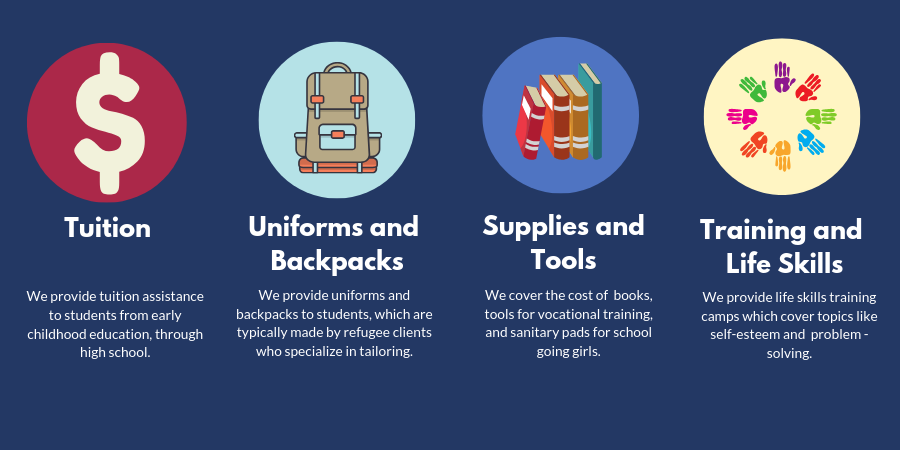PHOTO ABOVE: Daniel, RefugePoint client (left), sitting with Kimani, RefugePoint’s Education Officer.
Education as a Tool for Protection and Self-Reliance
For refugee children, going to school isn’t only about advancing their education, but also serves as an essential protection tool. At school, refugee children are able to rebuild critical support systems (teachers, mentors, coaches) that they may have lost. School also allows children to integrate into their new communities by learning new languages and develop new friendships.
For refugee parents, access to education, for their children, as well as for themselves, are both crucial. When children attend school, parents have more flexibility to pursue income-generating activities, which helps lead to self-reliance. For refugee adults, apprenticeship and vocational skills training allows them to pursue their passions and develop their skills, helping them to become more financially stable.
How RefugePoint Provides Educational Support
The costs of attending school are often out of reach for refugee families, since accessing food and shelter are the top priorities. In response to some of these challenges, RefugePoint provides educational support, in the form of uniforms, school fees, and academic materials, to at-risk refugee children to enhance access and retention in school. RefugePoint supports students in early childhood education, primary school, secondary school, special education, and apprenticeship and vocational skills programs.
Our social work, counseling, and child protection teams, as well as community volunteer workers, help to identify and refer children in need of education assistance. Once enrolled in school, monitoring becomes an integral part of the education process. To ensure that services are being delivered in a quality manner, RefugePoint’s Education Officer makes school visits to check-in on students, serves as a mentor to students, participates in case reviews for supported children, and gathers feedback from students.

Partnerships and Life Skills Trainings
Thanks to strong partnerships, our Education program has been able to grow over the years – initially from supporting only primary school access, to launching access to secondary school, early childhood education, and apprenticeship and vocational skills training.
We network with Kenya’s Ministry of Education to enroll refugee children into Kenyan schools, including those transitioning from Kenyan primary school system into secondary school.
Initially, RefugePoint hosted an annual day-long life skills training camp for students during school holidays in December. Through the support of numerous partners, we now hold a yearly collaborative life skills training camp that lasts a full week and is attended by more than 300 students. The life skills training is a forum where children and young adults come together to have fun, socialize, and develop new ways of thinking and problem-solving. The training is always conducted in the communities where participants live and covers topics such as: self-awareness, self-esteem, coping with emotions, coping with stress, effective communication, conflict resolution, negotiation, friendship formation, assertiveness, and peer pressure resistance.
Students who have completed secondary school and who are now enrolled in university are invited to attend to share their own experiences and encourage younger students. The camps also provide a forum for peer-to-peer learning, where students share challenges and barriers that they face and brainstorm solutions together.
Related Content
RefugePoint’s Education Officer, Kimani Gichia, Describes RefugePoint’s Education Program
